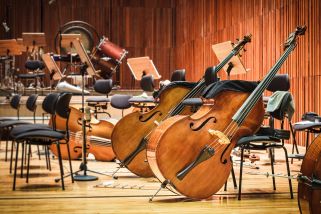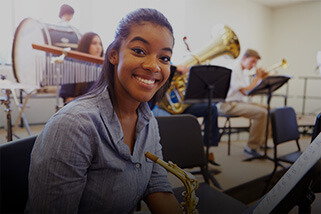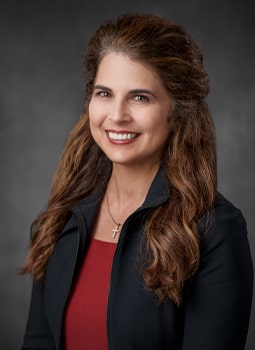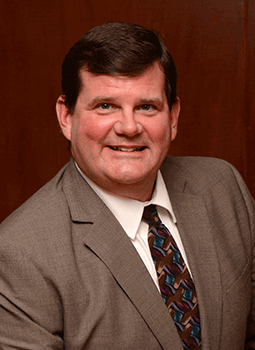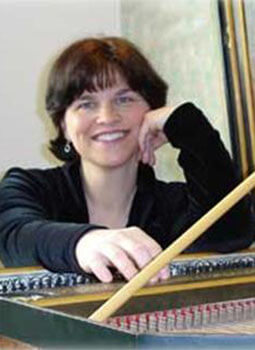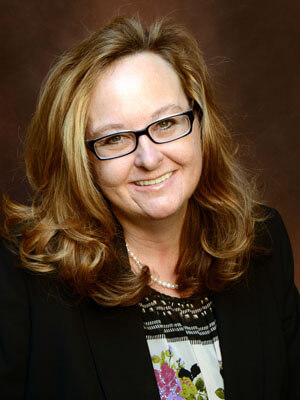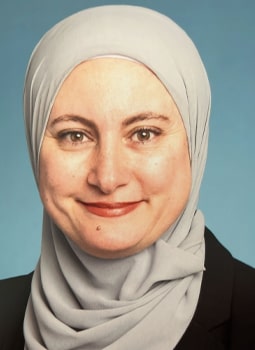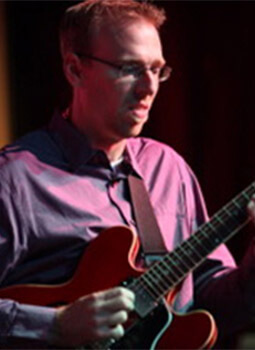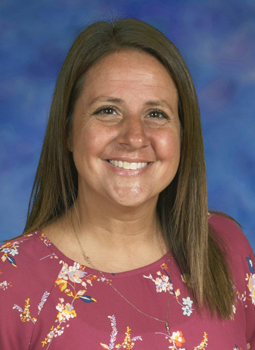B.M. in Music Education (PK-12)
Inspire a Lifelong Love of Learning
The Music Education program (Pre-K-grade 12) prepares students to earn a teaching license and teach in public and private schools. Our music education degree is certified by the Illinois State Board of Education (ISBE). Students will learn about different teaching methods and classroom management skills used in different settings. Students finish the Music Education program with a student teaching experience, where they work with a mentor to gain more experience teaching students of all ages.
Why Earn Your B.M. in Music Education?
Students in the Music Education program prepare for a teaching career in either vocal or instrumental music or a combination of the two. Saint Xavier University's Music Education degree programs are certified by the Illinois State Board of Education. The prospective music teacher will develop skills in musicianship and performance in addition to learning to be a sensitive ensemble conductor. Students will gain knowledge in teaching music at a variety of levels to different age groups and in different settings while developing a strong understanding of child growth and development. Learning to assess the progress of music students while acquiring the knowledge of excellent methods of teaching is essential to this program. The University is fully accredited by the National Association of Schools of Music. A music education degree provides graduates the opportunity to work in public, private, magnet, or charter schools, professional associations, international schools, publishers, religious organizations, higher education and much more.

About the Program
Saint Xavier University is an accredited institutional member of the National Association of Schools of Music and offers the following degree programs: a Bachelor of Music in Music Education (Pre-K- grade 12) with the teaching of music as the major area of concentration and a Bachelor of Arts in Music, in which students may choose an optional emphasis in either performance or jazz and commercial music.
In the Music Education program, the student may prepare for a teaching career in either vocal or instrumental music or a combination of the two. The Music Education programs are certified by the Illinois State Board of Education.
Saint Xavier University provides various resources to students enrolled in the program. Students have access to instrument lockers, a music lounge, practice rooms with pianos, a computer lab with the latest software and much more. Saint Xavier University offers peer academic tutoring in music through the Center for Learning and Student Support. The center also provides other academic resources and services.
First-Year Experiences, Learning Communities and Collaborative Assignments and Projects
- All music majors take a common core of musicianship classes together (Music Theory, Aural Skills, and Keyboard Skills).
- Students gain unique music ensemble experiences (a strong sense of community is developed in rehearsals, concerts, etc.).
Diversity/Global Learning
- All music majors must take a World Music course.
- Jazz emphasis majors must take a Jazz History course.
ePortfolios
Students have the opportunity to record solo performances, music concerts and recitals.Undergraduate Research (individualized instruction)
- Applied Lessons -- one-on-one music lessons
- Pedagogy classes -- supervised teaching
Capstone Courses and Projects
- Junior and Senior Recitals or Senior Projects
- Student Teaching for Music Education students
Common Intellectual Experiences
Attendance at performances, practicums (weekly recital class), student and faculty recitals, and guest artists/clinicians.Saint Xavier University Music
Saint Xavier University is dedicated to providing a top-quality education that is intentionally designed to develop your skills and expertise as you prepare for the next step in your education or career. The learning outcomes reflect the specific competencies that you will gain from the Music program while the curriculum map portrays how these competencies will shape and prepare you for the real world.
- Performance -- Students will develop knowledge and skills in one or more areas of music, beyond basic musicianship, at a level consistent with a liberal arts degree and will understand procedures for realizing a variety of musical styles.
- Musicianship -- Students will develop the ability to identify and work conceptually with elements of music and read and understand musical notation.
- Composition -- Students will understand compositional processes, aesthetic properties of style, and the ways these shape and are shaped by artistic and cultural forces.
- History and Repertory -- Students will be acquainted with a wide selection of musical literature, the principal eras, genres and cultural sources.
- Synthesis -- Students will develop and defend musical judgments.
- Study at one of the most affordable Catholic universities in Illinois according to CollegeNavigator.gov
- You will be eligible for up to $24,000 in music awards over your four years studying at Saint Xavier University.
- You will further develop your passion for music by refining and enhancing your musicianship through weekly private lessons, music classes, and ensemble rehearsals.
- Small class sizes allow for more individualized instruction and planning tailored to your needs.
- Study with experienced music professionals who are actively performing around the Chicagoland Area with the Chicago Symphony Orchestra and Chorus, Northwest Indiana Symphony Orchestra and Chorus, Elgin Symphony Orchestra and more.
- Earn a job or continue onto graduate music program soon after graduation.
Students may choose to minor in music, complementing another degree program, such as psychology, business, computer science, elementary education or other areas of study.
Request Information
Want to know more about undergraduate programs at Saint Xavier University? Please fill out the form below!
Contact the Office of Admission
- 773-298-3050
- Toll Free: 844-GOTO-SXU (844-468-6798)
- Fax: 773-298-3076
- Email: admissionFREESXU
- M-F: 8:30 a.m. to 4:30 p.m.
Music Audition
A student wishing to study as a music major or minor must audition for admission to the Music Department as a music major or music minor candidate.
Learn moreDirector of Education
Meet the Faculty
